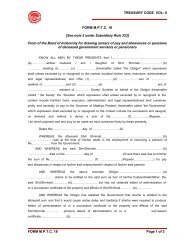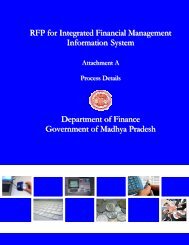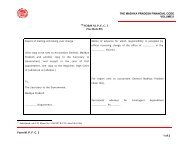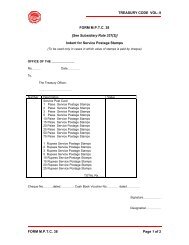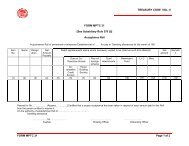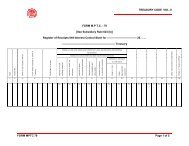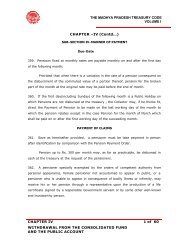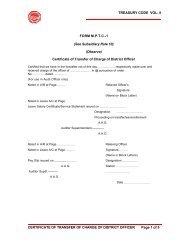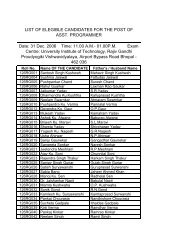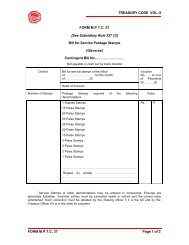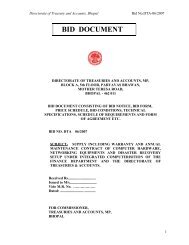THE MADHYA PRADESH FINANCIAL CODE ... - MP Treasury
THE MADHYA PRADESH FINANCIAL CODE ... - MP Treasury
THE MADHYA PRADESH FINANCIAL CODE ... - MP Treasury
You also want an ePaper? Increase the reach of your titles
YUMPU automatically turns print PDFs into web optimized ePapers that Google loves.
<strong>THE</strong> <strong>MADHYA</strong> <strong>PRADESH</strong> <strong>FINANCIAL</strong> <strong>CODE</strong><br />
VOLUME II<br />
APPENDIX 5<br />
(See Rule 96)<br />
RULES FOR <strong>THE</strong> SUPPLY OF ARTICLES FOR <strong>THE</strong> PUBLIC SERVICE<br />
(STORE RULES) AND INSTRUCTIONS FOR <strong>THE</strong> GUIDANCE OF<br />
OFFICERS WHO ARE REQUIRED TO MAKE PURCHASES OF STORES<br />
UNDER <strong>THE</strong> PROVISIONS <strong>THE</strong>REOF<br />
PREAMBLE TO <strong>THE</strong> RULES<br />
The policy of State Government is to make their purchase of stores for the public<br />
service in such a way as to encourage the development of the industries of this State<br />
in particular and the country in general to the utmost possible extent constistent with<br />
economy and efficiency, and the following rules, which are applicable to the purchase<br />
of stores (other than Printing and Stationery Stores) are prescribed for Madhya<br />
Pradesh by the State Government in accordance with this policy. These Rules<br />
supersede all previous orders on the subject.<br />
In order to give effect to the above policy, preference in making purchases will be<br />
given in the following order –<br />
Firstly – to articles which are produced by Small Scale Industries of Madhya<br />
Pradesh and registered as such with the Director of Industries provided the quality is<br />
sufficiently good;<br />
Secondly – to articles which are produced by Medium and Large Industries of<br />
Madhya Pradesh provided the price and quality is comparable with the article<br />
produced out side the State;<br />
Thirdly – to articles which are produced in India in the from of raw materials<br />
or are manufactured in India, from raw materials produced in India, provided that<br />
the quality is sufficiently good for the purpose;<br />
Fourthly – to articles wholly or partially manufactured in India from imported<br />
materials provided that the quality is sufficiently good for the purpose;<br />
imported.<br />
Sixthly – to articles manufactured abroad which need to be specially<br />
Appendix 5 1 of 18<br />
Rules for the supply of articles for the<br />
public service (store rules)
<strong>THE</strong> <strong>MADHYA</strong> <strong>PRADESH</strong> <strong>FINANCIAL</strong> <strong>CODE</strong><br />
VOLUME II<br />
1 “Competent authority shall give preference to articles manufactured by the<br />
Small Scale Industries of Madhya Pradesh registered as such for the concerned<br />
articles with the Director of Industries”.<br />
1. The rules express a definite preference for articles which are produced by small<br />
scale Industries of Madhya Pradesh.<br />
2. The difference in the character of the preferences which may be given should be<br />
carefully noted. In the case of first four categories mentioned in the preamble to<br />
condition is that the quality is sufficiently good for the purpose, and for the fifth<br />
category that the articles are of suitable type and requisite quality. This means<br />
that the articles coming under first four categories should be accepted in the<br />
order unless it is considered that the quality is definitely not up to the standard<br />
required even though articles manufactured else where and imported articles<br />
may be considered to be of better quality.<br />
3. The other kind of preference referred to in the rules is the reservation or certain<br />
articles produced or manufactured by the small Scale Industries, to be purchased<br />
only through the M.P. Laghu Udyog Nigam Limited.<br />
4. A strict comparision with prices prevailing abroad is not required, but the<br />
underlying principle is that the preference to be accorded to Indian products or to<br />
imported stocks is to be tempered by the consideration of economy.<br />
5. Every proposal for the grant of price preference, (otherwise than in accordance<br />
with these rules), should be referred by purchase officers concerned through<br />
proper channel to State Government in Commerce and Industry Department.<br />
Rule 1 – Save as provided in rules 9 and 10 all articles required to be purchased for<br />
the public service shall be purchased on the condition that delivery shall be made in<br />
India for payment in rupees in India.<br />
6. it should be carefully noted by all purchasing officers that under revised rules the<br />
purchase in India of all articles (with the exception of the classes of stores<br />
specified in rule 9) required for the Public Service is obligatory.<br />
7. Indents for stores, other than the classes or stores specified in rule 9, should<br />
not be sent to the Director General of stores, London, but the stores should be<br />
1 Substituted vide Commerce and Industry dept. No. F5/7/78/B/IX dt. 29.4.78<br />
Appendix 5 2 of 18<br />
Rules for the supply of articles for the<br />
public service (store rules)
<strong>THE</strong> <strong>MADHYA</strong> <strong>PRADESH</strong> <strong>FINANCIAL</strong> <strong>CODE</strong><br />
VOLUME II<br />
obtained by calling for tenders in India in accordance with the provisions of the<br />
revised rules.<br />
8. It should be clearly stated in all invitations to tender, issued by purchasing<br />
officers in India, that tenderers must provide in their tenders for delivery in India<br />
and that payment for the articles will be made in rupees in India.<br />
9. 2 With reference to the principles of preference and reservation mention in the<br />
preamble, tenderers should be requested to furnish information in regard to the<br />
country of manufacture and/or origin of the material used in the manufacture of<br />
the articles.<br />
10. Purchasing Officers may exercise full discretion regarding the point or place of<br />
delivery to be specified in their invitation to tender. They may specify G.I.F. or<br />
F.O.R. Indian port, F.O.R. place of despatch in India or Free Delivery receiving<br />
station in India. Where tenders are invited for plant and equipment, in which the<br />
erection of the plant at site is to be undertaken by the successful tenderer,<br />
appropriate terms in regard to delivery at site should be included in the invitation<br />
to tender or in the general specifications.<br />
11. When specifying the point or place or delivery purchasing officers should<br />
endeavour to lay down terms which will give all tenderers equal opportunities to<br />
put forward their lowest prices. For instance, in many cases tenderes, abroad<br />
may be unable to tender for delivery F.O.R. India port or free delivery receiving<br />
station in India and may only be able to tender on the basis or delivery G.I.F.<br />
Indian port with payment in rupees in India against shipping documents. Such<br />
tenders should be considered as coming with in the meaning of rule 1 and should<br />
be accepted if satisfactory in other respects.<br />
12. Except in special cases full payment for the stores should not be made against<br />
shipping documents but only after delivery of stores has been taken by the<br />
receiving officers and they are found to be satisfactory in every respect.<br />
Rule 2 – Tenders shall be invited in India and abroad also when considered<br />
desirable for the supply of all articles which are purchased under rule 1 to 5 unless<br />
the value of the order to be placed is small or sufficient reasons to be record exist<br />
which indicate that it is not in the public interest to call for tender no tender which<br />
2 Substituted vide Commerce and Industry dept. No. f5/7/78/B/IX dt. 29.4.78<br />
Appendix 5 3 of 18<br />
Rules for the supply of articles for the<br />
public service (store rules)
<strong>THE</strong> <strong>MADHYA</strong> <strong>PRADESH</strong> <strong>FINANCIAL</strong> <strong>CODE</strong><br />
VOLUME II<br />
falls to comply with condition as to delivery and payment prescribed in rule 1 shall<br />
be accepted.<br />
Provided That Subject to Rule 14<br />
“Where purchase of items reserved in annexure B for the registered small scale<br />
industries of Madhya Pradesh is to be made no tender shall be invited and the rates<br />
quoted by the M.P. Laghu Udog Nigam Limited shall be binding on the competent<br />
authority”<br />
Note – For the purchase of articles or group of articles costing up to Rs. 250<br />
(Rs. Two hundred and fifty) on each occasion tenders may not be invited, if in the<br />
opinion of competent authority which should be recorded in writing, it is not possible<br />
to follow the usual procedure.<br />
13. In selecting the tender to be accepted the financial status of the individuals and<br />
firms tendering must be taken in to consideration in addition to all other relevant<br />
factors. In cases where the lowest tender is not accepted, reasons therefor<br />
should be placed on record.<br />
14. The rule authorises the issue of invitations to tender to firms abroad “when<br />
considered desirable”. The discretion to invite such tender will vest in the Head of<br />
the Department concerned.<br />
15. Tenders should be invited abroad as well as in India, Whenever it is considered<br />
necessary or desirable to do so in order to obtain adequate publicity and to<br />
ensure economical Purchase. These considerations will apply mainly to the<br />
categories of stores which have wither to been obtained by indent on the Director<br />
General India Store Department, London, and when dealing with the purchase of<br />
such classes of stores it is essential that tenders should be invited abroad in<br />
order to obtain wide competition and utilize all possible sources of supply.<br />
16. If the response to any invitation to tender indicates that, owing to inadequate<br />
publicity or some other reasons, favorable tenders have not been received, then<br />
fresh tender should be invited and measures taken to bring the invitation to<br />
tender to the notice of all possible tenders.<br />
17. When the circumstances of a particular case indicate the desirability of obtaining<br />
tenders from firms established abroad, who have no branches of agencies in<br />
Appendix 5 4 of 18<br />
Rules for the supply of articles for the<br />
public service (store rules)
<strong>THE</strong> <strong>MADHYA</strong> <strong>PRADESH</strong> <strong>FINANCIAL</strong> <strong>CODE</strong><br />
VOLUME II<br />
India, a sufficient supply of tender forms with the relevant documents,<br />
specifications and drawings should be sent as soon as possible to the Director<br />
General, India Store Department, London. The latter will give such publicity to<br />
the demand as he may consider to be most suitable for the purpose, by<br />
advertisement in the news papers or otherwise. Demands estimated to cost Rs.<br />
20,000 or over will, as a rule, be advertised by him.<br />
Intending tenders established abroad will be instructed by the Director General, India<br />
Store Department, London, to apply to him for the tender forms, copies of which will<br />
be supplied by him on payment in sterling of the charges (if any) to be fixed by him<br />
in each case. The tenderer will at the same time be instructed to submit their<br />
tenders direct to the purchasing officer concerned in India and not to the India Store<br />
Department London, and the order will be placed by former direct with the successful<br />
tenderer.<br />
18. When it is desired to have the recommendations of the technical advisers of the<br />
London Store Department, e.g., the Consulting Engineers. Naval Architects, etc.<br />
on the tenders, before a decision is reached as to the placing of the order, it<br />
should be stipulated in the invitation to tender that a complete duplicate of the<br />
tender should be delivered to the Director General, India Store Department,<br />
London, on the same date as that fixed for the submission of the tender in India.<br />
The Director General, India Store Department will arrange for examination of the<br />
tenders by the appropriate technical authority and will telegraph his<br />
recommendations to the purchasing officer concerned in India. For the work<br />
connected with this examination of tenders, the Director General India Store<br />
Department will make a fixed charge against all Commercial and other<br />
departments who are not entitled to utilize the services of the London Store<br />
Department free of cost.<br />
19. It should be made clear on every tender form that he stores must be delivered in<br />
India, that payment will be made in India in rupees, and that any tender which<br />
does not comply with these conditions will not be considered. Tenders abroad<br />
should also be required to specify their agents in India through whom delivery<br />
will be arranged and payment received, and who, when so required, will arrange<br />
for erection at site and for the carrying out of such tests on completion as may be<br />
specified in the contract.<br />
Appendix 5 5 of 18<br />
Rules for the supply of articles for the<br />
public service (store rules)
<strong>THE</strong> <strong>MADHYA</strong> <strong>PRADESH</strong> <strong>FINANCIAL</strong> <strong>CODE</strong><br />
VOLUME II<br />
20. No account adjustments will be made between the high Commissioners Office<br />
and the purchasing department in India for the value of tender forms sent to<br />
London and issued on behalf of the purchasing authorities in India and the<br />
expenditure on advertisements, postage charges etc. in the High Commissioner's<br />
Office.<br />
21. When considering the desirability of calling for tenders abroad it is important that<br />
purchasing officers in India should bear in mind the necessity of allowing<br />
sufficient time for the receipt and publication invitation to tender, the receipt of<br />
the tender form by tenderers, and the preparation and despatch of the tenders to<br />
India.<br />
22. The following is an approximate estimate of the time required ;<br />
Time required for sending the forms from India to London –<br />
By Ordinary Mail - About 18 days<br />
By Parcel Mail - About 27 days<br />
By Air Mail - About 8 days<br />
Time taken in London in advertising and issuing forms of tender ,say 10 days<br />
Time required by tenders to prepare and despatch tenders, average, say14 days.<br />
Time required for forwarding the tenders to India –<br />
By Ordinary Mail - About 18 days<br />
By Parcel Mail - About 27 days<br />
By Air Mail - About 8 days<br />
If American tenders have to be awaited about three weeks will require to be added<br />
to the above figures and in cases of complicated engineering schemes it will be<br />
necessary to allow a longer time to tenderers for the preparation of their tenders.<br />
23. Rule 2 does not preclude the use of limited or single tenders, nor does it require<br />
that tenders should be called for where it is clearly not in the public interest to do<br />
so.<br />
The following procedure for obtaining tenders should be followed as for as<br />
practicable:–<br />
Tenders should to obtained –<br />
By advertisement (open tender) –<br />
(2) By Direct invitation to a limited number of firms (Limited tender).<br />
(3) By invitation to one firm only (Single tender, or ‘private purchase).’<br />
Appendix 5 6 of 18<br />
Rules for the supply of articles for the<br />
public service (store rules)
<strong>THE</strong> <strong>MADHYA</strong> <strong>PRADESH</strong> <strong>FINANCIAL</strong> <strong>CODE</strong><br />
VOLUME II<br />
24. The ‘open tender’ system i.e. invitation to tender by public advertisement should<br />
be used as general rule and must be adopted subject to the exception noted<br />
below in all cases in which the estimated value of the tenders to be received is<br />
Rs. 25000/- or over.<br />
25. The India Trade Journal Published by the Director General of Commercial<br />
Intelligence and Stastics, Calcutta, which is a Government publication should be<br />
regarded as the standard medium for public advertisement in India.<br />
Advertisements may, however, at the discretion of the purchasing officer be<br />
inserted in one or more of the principal newspapers in India.<br />
26. When in the circumstances stated in paragraph 15 it is decided to invite tenders<br />
from abroad the procedure described in paragraphs 14 and 18 should be<br />
followed.<br />
27. The “Limited tender” system should ordinarily be adopted in the case of all orders<br />
the estimated value of which is less than Rs. 25000.<br />
28. For the purposes of the limited tender and single tender procedure the<br />
purchasing officers will maintain a list of firms, both Indian and foreign, of known<br />
reliability who have been able to satisfy them that they possess the necessary<br />
equipment and facilities for the supply of stores which they offer. The list should<br />
be subjected periodically to examination and revision, and any application from<br />
firm for inclusion in the list should be considered on its receipt. Before the name<br />
of a firm is added to the list such enquiries as may be considered necessary<br />
should be made by the purchasing officers to ascertain the ability of the firm to<br />
execute contracts satisfactorily. From this list the names of firms to be invited to<br />
tender should be selected.<br />
29. Such a list is already maintained by the India Store Department and the Director<br />
General of Supple and disposals will, on receipt of a request, furnish purchasing<br />
officers with such information as he may possess regarding the capability and<br />
standing of any firm approved by him.<br />
30. The ‘Single tender’ system may be adopted in the case of small orders, or when<br />
the articles required are of a proprietary character and competition is not<br />
considered necessary. A ‘Small order’ shall be interpreted to mean for this<br />
purpose an order the total value of which does not exceed Rs. 500. In all such<br />
cases, however, the purchasing officer should consider whether it is not feasible<br />
Appendix 5 7 of 18<br />
Rules for the supply of articles for the<br />
public service (store rules)
<strong>THE</strong> <strong>MADHYA</strong> <strong>PRADESH</strong> <strong>FINANCIAL</strong> <strong>CODE</strong><br />
VOLUME II<br />
to enter into a rate or running contract for the articles in question or to utilize the<br />
rate or running contracts entered into be the Director General of Supplies and<br />
Disposals.<br />
31. The ‘Limited tender’ system may, however, be adopted instead of the Open<br />
tender’ system even when the estimated value of the tenders to be received is<br />
not less than Rs. 25000 in the following cases :<br />
(a) When sufficient reasons exist which indicate that it is not in the public interest<br />
to call for tenders by advertisement. In every case the reason must be<br />
recorded by the purchasing officer and communicated to the Accountant<br />
General confidentially, if necessary.<br />
(b) When the indenting officer certifies that the demand is urgent and any<br />
additional expenditure involved by the elimination of open competition must<br />
be incurred. In all such cases the indenting officer must place on record the<br />
nature of the urgency and why the demand could not be anticipated.<br />
32. When tenders are invited by public advertisement the issue of the tender forms<br />
need not be restricted to firms whose names are on the list of approved<br />
contractors. Firms not on the list should on enquiry, be informed that they are at<br />
liberty o payment of the prescribed fee to tender for advertised requirements.<br />
When a tender which appears to be satisfactory has been received from an<br />
unknown firm steps should be taken before any order is placed to ascertain<br />
whether the firms is Capable of executing the work in a proper manner. If the<br />
enquiries prove satisfactory, the order or a portion of it, may be placed with the<br />
firm. If the order or the portion thereof is satisfactorily executed, the name of the<br />
firm should be added to the list of approved contractors.<br />
33. Madhya Pradesh laghu Udyog Nigam Limited, M.P., State Agro Industries<br />
Development Corporation Limited and the Small Scale Industries registered with<br />
the Directorate of Industries are exempted from payment of a earnest money<br />
security deposit for the purpose of participating in Government purchase<br />
programme. Tenders from such industries whose competency is certified by the<br />
Director of Industries should, therefore, be accepted without security deposits. A<br />
campetency certificate issued by the Director shall be in force for a period of two<br />
years unless it is withdrawn.<br />
Appendix 5 8 of 18<br />
Rules for the supply of articles for the<br />
public service (store rules)
<strong>THE</strong> <strong>MADHYA</strong> <strong>PRADESH</strong> <strong>FINANCIAL</strong> <strong>CODE</strong><br />
VOLUME II<br />
Whenever in such cases supplier fails to deliver the stores the Director of Industries<br />
should be immediately apprised of it. He may take appropriate action having regard<br />
to merits of each case and remove the name of the firm from the list of industrial<br />
units qualified for the above concession for a period not exceeding two years.<br />
33. (A) Repeat orders may be placed against a previous order recently placed but in<br />
any case not later than six months after the initial order was placed, provided –<br />
(i) that no Repeat Order shall be placed if the original order was placed to<br />
cover an urgent or emergent demand and while placing a Repeat order it<br />
is certified to that effect;<br />
(ii) that the new demand does not exceed the quantity originally ordered in<br />
the case of indents of Rs. 50000 or less in value and 50% of the quantity<br />
originally ordered in other cases;<br />
(iii) that the officers empowered to place such orders satisfy themselves that<br />
there has been no downward trend in the prices since to original order<br />
was placed and the placing of the Repeat Order is considered to be in the<br />
interest of Government.<br />
Rule –3 Subject to rule 14, articles which are produced or<br />
manufactured in Madhya Pradesh should be purchased in preference<br />
to articles produced or manufactured in other parts of India.<br />
Provided that the quality is sufficiently good and the price<br />
reasonable.<br />
Rule – 4 All articles whether manufactured in India or abroad shall<br />
be subject to inspection before acceptance, and articles, for which<br />
specifications and/or tests have been prescribed by the Government<br />
of India or the State Government shall be, required to conform to<br />
such specifications and/or to satisfy the prescribed test or tests<br />
which may be carried out during manufacture or before or after<br />
despatch from the suppliers premises.<br />
Rules – 5 Subject to rule 14 important plant machinery and iron and<br />
steel work shall be obtained only from firms approved by the Director<br />
General of supplies and disposals India store department and<br />
specified in the list issued by him from time to time.<br />
34. The intention of rule 5 is to ensure that plant, machinery and other engineering<br />
equipment e.g., bridge girders, roof trusses which from important components of<br />
a projected shall be obtained only from firms which popsess workshops and<br />
appliances capable of turning out work of the desired standard.<br />
Appendix 5 9 of 18<br />
Rules for the supply of articles for the<br />
public service (store rules)
<strong>THE</strong> <strong>MADHYA</strong> <strong>PRADESH</strong> <strong>FINANCIAL</strong> <strong>CODE</strong><br />
VOLUME II<br />
35. The lists referred to in this rule will be maintained and issued from time to time<br />
to all purchasing departments by the Director General of Supplies and Disposals,<br />
India Store Department. They will include the names of firms in India and abroad<br />
which have been approved for the supply of important plant, machinery and iron<br />
and steel work.<br />
36. Applications for inclusion in the lists mentioned in this rules should be made to<br />
the Director General of Supplies and Disposals, India Store Department, direct by<br />
the firm with a full statement of the reasons which in their opinion justify such<br />
inclusions.<br />
37. Cases may arise in which tenders may be received from firms whose names do<br />
not appear in the lists of approved firms. If the tenders are primafacie<br />
satisfactory, they should not be summarily rejected, but a reference should be<br />
made to be Director General of Supplies and Disposal, India Store Department,<br />
who will, if he considers it necessary, make enquiries in regard to the capabilities<br />
and standing of the tendering firms and will intimate the result of the enquiries<br />
and sanding of the tendering firms and will intimate the result of the enquiries to<br />
the purchasing officer concerned.<br />
Rule – 6. In the case of important construction works let our on contract, articles<br />
required for the construction of such works may be supplied by the contracting firm<br />
provided than when specifications and/or tests have been prescribed for such<br />
articles they shall conform to such specification and/or shall satisfy such tests.<br />
38. The object of rules 4 and 6 is to emphasize the importance of ensuring that<br />
articles purchased for the public service conform to the specifications, which may<br />
be prescribed by competent authority, and the necessity, for careful inspection of<br />
all stores before acceptance. The appropriate specifications should be annexed to<br />
or quoted in the invitations to tender and it should be stipulated in the conditions<br />
of contract that the articles supplied will be subject to inspection and/or tests<br />
prescribed in the specifications before acceptance.<br />
39. When tenders for important construction works are invited the officer concerned<br />
should also stipulate in the invitations to tender that the articles required for the<br />
constructions of such works must comply with the specifications prescribed for<br />
such articles. The articles should be inspected and/or tested in accordance, with<br />
the provisions of the specification before acceptance.<br />
Appendix 5 10 of 18<br />
Rules for the supply of articles for the<br />
public service (store rules)
<strong>THE</strong> <strong>MADHYA</strong> <strong>PRADESH</strong> <strong>FINANCIAL</strong> <strong>CODE</strong><br />
VOLUME II<br />
40. All purchasing officers should pay special attention to these points, and should<br />
take steps to ensure that adequate inspection arrangements are made in cash<br />
case.<br />
41. When articles are obtained from abroad which require inspection and/or test<br />
during manufacture and before shipment, arrangements should be made by the<br />
purchasing officer concerned for such inspection and/or tests to be carried out by<br />
the India, Store Department, London, Any further inspection and tests considered<br />
necessary or desirable after receipt of the articles in India should be arranged for<br />
by the purchasing Department. The services of the India Store Department can<br />
be utilized in connection with such inspection and tests.<br />
42. As soon as a contract for articles which require inspection and/or test during<br />
manufacture or before shipment from abroad has been awarded, four complete<br />
copies of the accepted tender with specifications, drawings, conditions of<br />
contract, and all other relevant documents, should be sent to the Director<br />
General, India Store Department, London, with complete instructions for<br />
inspection and the full address of the manufactures. The contractors should be in<br />
formed that inspection during manufacture or before shipment will be carried out<br />
by Director General, India Store Department, London, and he should be asked to<br />
instruct his representatives in the country of manufacture to communicate direct<br />
with that officers.<br />
43. With regard to the inspection of articles obtained or manufactured in India all<br />
purchasing officers can, if they so desired, utilize the service of the India Store<br />
Department for the inspection and/or test during manufacture and before<br />
desptach.<br />
44. In the case of orders for plant and machinery, whether purchased in India or<br />
obtained from abroad, from abroad, which include creation and test at site of<br />
work, arrangements for inspection and test after erection at site can also be<br />
made thorugh the India Store Department.<br />
Rule 7 . – Indenting officers in the case of purchases in India above 3 [Rs.<br />
50000]each in values must use the agency of the director General of<br />
supplies and disposals unless they can show that they can themselves<br />
3 The words and figures Rs. substituted with Rs. 50000 vide Commerce and Industry dept. No.<br />
1156/3829II/8/B/IX dt. 28.8.73<br />
Appendix 5 11 of 18<br />
Rules for the supply of articles for the<br />
public service (store rules)
<strong>THE</strong> <strong>MADHYA</strong> <strong>PRADESH</strong> <strong>FINANCIAL</strong> <strong>CODE</strong><br />
VOLUME II<br />
purchase the materials more cheaply, or in a case of urgency more<br />
expeditiously.<br />
4 “Provided that where purchases are made through the M.P. Laghu<br />
Udyog Nigam Limited: the above restriction shall not apply.”<br />
45. The intention of rule 7 is that the agency of the Director General of Supplies and<br />
Disposals should be utilized when the value of a purchase made at one time<br />
exceeds Rs. 50000 irrespective of whether such a purchase is of a single article<br />
or of a number of articles of the same kind when a number of diverse articles are<br />
included in the indent, the limit of Rs. 50000 shall apply to each such articles or<br />
group of articles of one kind included in the demand.<br />
Rule 8. – Nothin in these rules shall be deemed to prohibit the purchases of<br />
articles by one department from another.<br />
Rule 9. – The articles enumerated in a Annexure ‘A’ or any other articles of a<br />
special or unusual character may, when suitable and economical purchases<br />
cannot be made in accordance with the preceding rules be obtained without<br />
reference to those rules subject to the following conditions –<br />
(a) where the value of the purchase exceeds Rs. 5000 the purchasing officer shall<br />
place on record his reasons for not effecting the purchase in accordance with<br />
the preceding rules.<br />
(b) The purchasing officer may at his discretion either obtain the article that he<br />
requires by indent on the India Store Department, London, or purchases it<br />
direct from manufacturers or dealers abroad subject to the limits prescribed<br />
in rule 12 of these rules. Where resort is had to direct purchase from<br />
manufacturers or dealers abroad, tenders shall. Whenever practicable, be first<br />
obtained.<br />
(c) When articles are purchased abroad under this rule through the agency of<br />
India Store Department, London, payment shall be made by the Department.<br />
In other cases payment shall be made –<br />
(i) in countries other than Great Britain and Northern Ireland, direct to the<br />
suppliers by the purchasing officers;<br />
4 Proviso to Rule 7 Substituted vide Commerce and Industry dept. No. F5/7/78/B/IX dt. 29.4.78<br />
Appendix 5 12 of 18<br />
Rules for the supply of articles for the<br />
public service (store rules)
<strong>THE</strong> <strong>MADHYA</strong> <strong>PRADESH</strong> <strong>FINANCIAL</strong> <strong>CODE</strong><br />
VOLUME II<br />
(ii) in Great Britain and Northern Ireland, through the High Commissioner for<br />
India.<br />
46. Rule 9 is in the nature of an exception to the principle enunciated in rule 1.<br />
Before availing himself of th discretion given by the rule it will be incumbent on<br />
every purchasing officer to take all possible steps o assure himself that the stores<br />
of the requisite qualities cannot be obtained in India at suitable prices in<br />
accordance with the provisions of rule 1. In order to ensure that he underlying<br />
principles of the rules are not violated, a copy of all orders for stores placed<br />
abroad whether on the London Store Department or directly on the suppliers,<br />
under the rule, should be forwarded to the Director General of Supplies and<br />
Disposals, India Store Department for sorting, and also for the purpose of<br />
compilation and publication of a list every two months of all such orders placed<br />
abroad.<br />
47. If orders are placed abroad under the provisions of rule 9 on the basis of delivery<br />
free on board vessel at port of Despatch, arrangements for the shipment of<br />
stores should be entrusted to the Director General, India Store Department,<br />
London.<br />
The indenting officer should inform the supplier of the arrangement and should send<br />
a copy of his order to the Director General, India Store Department London, for<br />
information.<br />
48. It will be noted that under the rule “articles of a special or unusual character”<br />
may be obtained by indent on the India Store Department, London Or purchased<br />
direct from manufactures or dealers abroad. It should be a clearly understood<br />
that he expression ‘articles of a special or unusual character” is not to be taken<br />
as covering generally the case of a special or unusual character” is not to be<br />
taken as covering generally the case of a articles not produced or manufactured<br />
in India, such as locomotive, boilers, plant, machinery, etc. The expression<br />
‘Articles of a special or unusual character” is intended to give purchasing officer<br />
liberty to obtain direct from manufacturers or through the Director General, India<br />
Store Department, London, articles such as spare of replace, parts of non<br />
standard appliances and other articles which cannot conveniently be obtained by<br />
calling for tenders on a rupee baiss. For example, a purchasing officer may<br />
require a replace part for a machine tool of a particular type and make, The<br />
Appendix 5 13 of 18<br />
Rules for the supply of articles for the<br />
public service (store rules)
<strong>THE</strong> <strong>MADHYA</strong> <strong>PRADESH</strong> <strong>FINANCIAL</strong> <strong>CODE</strong><br />
VOLUME II<br />
manufacturer may not be represented in India, and he may be unable to tender<br />
for delivery and payment in India. Again, a special type of machine may be<br />
invented and produced by a manufacturer who is not represented in India and<br />
who will only agree to supply his machine on his won conditions of sale.<br />
49. It should be noted that the inclusion of ‘Scientific Instruments’ in item (viii) of<br />
Annexure ‘A’ under this rule is not intended to permit the purchase of drawing,<br />
surverying and other mathematical instruments, either from manufactures or<br />
dealers direct of through the Director General, India Store department, London,<br />
Indents for such instrument should be placed with the mathematical Instruments<br />
officer of the Survey of India Department.<br />
Rule 10 – The purchasing officer shall obtain by indent on the India Store<br />
Department London all particles not produced in India and required to be<br />
purchased for the public service, stocks or which are not available in the<br />
country or could not be made available within the time such articles are<br />
required to be brought into services.<br />
In all such cases the purchasing officer shall before forwarding the<br />
indent, place on record his reasons for not effecting the purchase in<br />
accordance with the preceding rules and also sign on the indent a<br />
certificate in the following form –<br />
“I certify that from enquiries made, I am satisfied that the<br />
article/articles included in this indent is/are not at present available in<br />
stock in India and cannot be made available within the time such articles<br />
are required to be brought into service.<br />
Dated -------------------------- ----------------------<br />
---<br />
Purchasing Officer<br />
Rule 11 – Forecast of requirement which may be obained by indent on<br />
the India Store Department, London in cases in which stores are to be<br />
obtained through the India Store Department’ London: every effort<br />
should be made to foresee requirements, so that the indents may be<br />
despatched in ample time. It should be borne in mind that Government<br />
Appendix 5 14 of 18<br />
Rules for the supply of articles for the<br />
public service (store rules)
<strong>THE</strong> <strong>MADHYA</strong> <strong>PRADESH</strong> <strong>FINANCIAL</strong> <strong>CODE</strong><br />
VOLUME II<br />
stores are now liable to customs duty in exactly the same manner as<br />
private merchandise and that duties will be charged to the indenting<br />
department concerned. The forecast of expenditure on imported stores<br />
should accordingly, include customs duties.<br />
Rule 12. – Time required to obtain stores from England it may be<br />
assumed that the time required from the transmission of and indent<br />
upon the India Store Department London, to the receipt of the stores is –<br />
Urgent telegraphic indents not less than three months. Ordinary indents<br />
six to ten months according to the article demanded.<br />
For special stores E.G., large girders, rolling stock, etc. up to one year in<br />
ordinary time.<br />
Note – When ordinary stock articles conforming to well recognised standards are<br />
required within a shorter period than three months and the purchase is being made<br />
through the India Store Department in accordance with rule 9, the indenting officer<br />
shall, if he desires, that the procedure indicated in the resolution in the Department<br />
of Commerce and Industry No. 6862-6869-37, dated the 13 th September, 1911, be<br />
adopted, state the fact clearly in his telegraphic indent.<br />
5 Rule 13. – “Financial limits on powers of officers to make purchase in India<br />
and Abroad a Department of officers financial powers in the matter of the<br />
purchase of stores ordinarily extended to the limits to which it or these is<br />
empowered to enter into contract. But in the case of purchase made in India<br />
under clause “Fifthly” and “Sixthly” of paragraph 2 of the preamble the<br />
limits up to which power to purchase any one articles or any number of<br />
similar articles purchased at one time extend are as follows”-<br />
(A) Civil Deparment<br />
(i) The administrative departments of Government 2000<br />
(ii) Heads of departments and other officers of or above the rank<br />
of Collector whom the State Government may select.<br />
(iii) Other officers authorised to incur expenditure 100<br />
1500<br />
Note – The following officers exercise enhanced powers up to the money limits noted<br />
against each -<br />
5 Rule 13 Substituted vide Commerce and Industry dept. No. F5/7/78/B/IX dt. 29.4.78<br />
Appendix 5 15 of 18<br />
Rules for the supply of articles for the<br />
public service (store rules)
<strong>THE</strong> <strong>MADHYA</strong> <strong>PRADESH</strong> <strong>FINANCIAL</strong> <strong>CODE</strong><br />
VOLUME II<br />
(1) All Inspectors and Inspectresses of Chools, Madhya Pradesh<br />
and Principal, Prantiya Shikshan Mahavidyalaya, Jabalpur.<br />
(2) Principal, Mahakoshal Mahavidyalaya, Jabalpur 5000<br />
(3) Officers Commanding of Senior Divisions and Group<br />
Commanders of Junior Division of N.C.C. Units<br />
(iv) State Government Full powers<br />
(B) Public Works Department<br />
(i) Executive or Assistant Engineer holding charge of Division. 1000<br />
(ii) Superintending Engineer 5000<br />
(iii) State Government Full powers<br />
Note 1. – The money limits are inclusive of all incidental charges involved in effecting<br />
a purchase and these powers are subject to the rules of the budget system. No<br />
sanction will be given which will involve expenditure from the budget grant of any<br />
future year.<br />
Note 2. – The rule does not override the provisions of Financial Rule 100 in respect of<br />
contingent expenditure nor does it confer upon the officers concerned power to incur<br />
such expenditure to the extent detailed therein without the sanction of the<br />
competent authority.<br />
6 Rule 14. – Articles included in Annexure B which is subject to revision from<br />
time to time, produced or manufactured by Small Scale Industries of<br />
Madhya Pradesh registered as such, with Director of Industries for<br />
concerned articles shall be purchased through the M.P. Laghu Udyog Nigam<br />
Ltd. Only at the rates fixed by them. No tenders for purchase of such<br />
articles shall be called by the competent authority separately.<br />
Note 1. – The M.P. Laghu Udyog Nigam Ltd. Shall circulate lists of Small Scale<br />
Industries products intended to be marketed through the Nigam to the Heads of<br />
Departments and the Industries organisations from time to time.<br />
Note 2. – The M.P. Laghu Udyog Nigam limited shall float tenders keeping in view the<br />
demands of various departments, for items of standard sepcifications only. However,<br />
6 Substituted vide Commerce and Industry dept. No. f5/7/78/B/IX dt. 29.4.78<br />
Appendix 5 16 of 18<br />
Rules for the supply of articles for the<br />
public service (store rules)<br />
500<br />
250
<strong>THE</strong> <strong>MADHYA</strong> <strong>PRADESH</strong> <strong>FINANCIAL</strong> <strong>CODE</strong><br />
VOLUME II<br />
in case any department requires an item of particular specifications suiting to their<br />
requirements, the M.P. Laghu Udyog Nigam shall invite tenders accordingly.<br />
Note 3. – The respective purchasing departments shall nominate their<br />
representatives on the Laghu Udyog Nigam Marketing Committee for opening<br />
tenders and finalisation of rates.<br />
Note 4. – The rates decided by the Marketing Committee of Laghu Udyog Nigam shall<br />
be binding on the purchasing departments.<br />
In case the purchasing authority is not satisfied about the quality of items or<br />
competence of manufacturer the matter shall be decided by a Joint Committee<br />
consisting of the Nominees of the purchasing officer, the Director of Industries and<br />
the Laghu Udyog Nigam.<br />
Note 5. – The aforesaid Marketing Committee may enter into negotiations with the<br />
tenders, if necessary.<br />
Note 6. – The rates thus arrived at by the Marketing Committee of the Laghu Udyog<br />
Nigam shall be binding on the purchasing departments and all other departments<br />
requiring such items of the same, specifications. No tenders shall be separately<br />
floated by the individual departments or the same items.<br />
In case of any dispute in regard to the rate with the purchasing department, the<br />
matter shall be referred to the Government (Commerce and industry Department in<br />
consultation with Finance Department) for decision.<br />
Note 7. – While distributing the orders amongst the tendering units, the capacity,<br />
location and past performance of the unit along with the destination of the supplies<br />
shall be considered.<br />
Note 8. – Normally, the inspection of goods shall be made at the indenting stores.<br />
However, where necessary inspection may be arranged at the manufacturing works.<br />
Note 9. – In case of disputes between the manufacturing unit and the purchasing<br />
departments, where supplies have been inspected at work, the matter shall be<br />
referred to the Marketing Committee of Laghu Udyog Nigam for arbitration whose<br />
decision shall be final and binding on both the parties. In all other cases the decision<br />
of the purchasing departments shall be final and binding.<br />
Note 10. – “All payments shall be routed through the M.P. Laghu Udyog Nigam. The<br />
Departments should remit payment to Laghu Udyog Nigam within 21 days of the<br />
Appendix 5 17 of 18<br />
Rules for the supply of articles for the<br />
public service (store rules)
<strong>THE</strong> <strong>MADHYA</strong> <strong>PRADESH</strong> <strong>FINANCIAL</strong> <strong>CODE</strong><br />
VOLUME II<br />
receipt of material. In case of delay, the Laghu Udyog Nigam shall charge 1.5% p.m.<br />
interest on payment, due from the date of receipt of material.<br />
Or<br />
The M.P. Laghu Udyog Nigam Limited, may authorise such of the SSI Units, who may<br />
desire to raise direct bills on the Indenting Department / Departments and receive<br />
payments directly, and may do so, after executing necessary agreement with the<br />
Nigam.<br />
Note – Orders will however continue to be received directly by the M.P. Laghu Udyog<br />
Nigam from Indenting Officers/Purchasing Officers as provided in Rule 14, Similarly<br />
the procedure for placement of orders with the SSI units will also be continued as<br />
per existing practice under rules.<br />
Note 11. – The Laghu Udyog Nigam shall release payment to the supplying small<br />
Scale Industries within 10 days of the receipt of payment from the purchasing<br />
department.<br />
50. 7 “The Intention of rule 14 is that items, reserved for purchase, from the Small<br />
Scale Industries, shall be purchased from these industries only. Whenever such<br />
items are required to be purchased indent should be placed with the Laghu<br />
Udyog Nigam without inviting tenders and reasonable time should be given to<br />
them for making the supply. Only if the M.P. Laghu Udyog Nigam certify their<br />
inability to make the supply the purchase should be made from other sources in<br />
accordance with these rules.<br />
51. The purchasing authority while sending the bills to <strong>Treasury</strong> shall record a<br />
certificate on it to the effect that provisions of Rule 14 have been fully complied<br />
with.”<br />
Rule 15. – Power to Sanction departures from the rules. The State Government have<br />
power to sanction departures from the rule in cases in which departure is in the public<br />
interest. Applications for sanction in such cases should be made to the State Government<br />
in he Commerce and Industry Department.<br />
7 Substituted vide Commerce and Industry dept. No. f5/7/78/B/IX dt. 29.4.78<br />
Appendix 5 18 of 18<br />
Rules for the supply of articles for the<br />
public service (store rules)


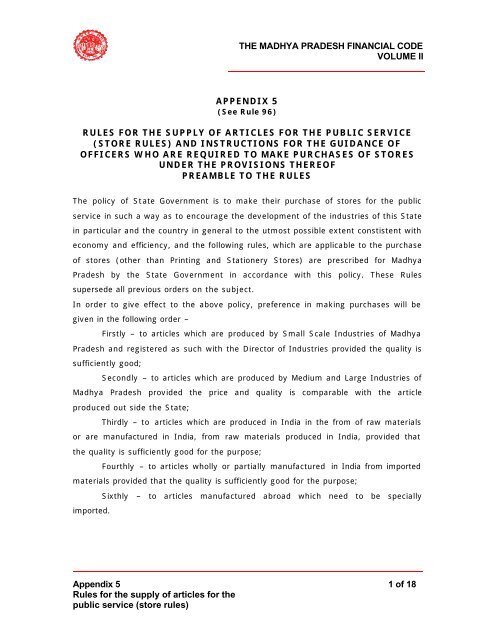
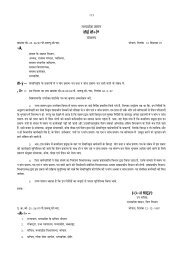
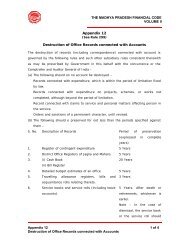
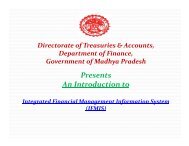
![Form M.P.F.C. 20 [See Rule 266 (4)] - Mptreasury.org](https://img.yumpu.com/50367893/1/190x146/form-mpfc-20-see-rule-266-4-mptreasuryorg.jpg?quality=85)
